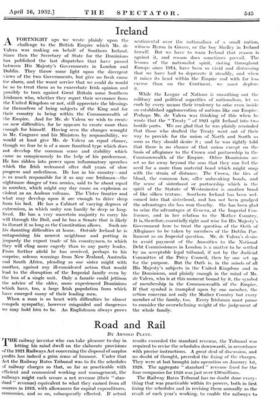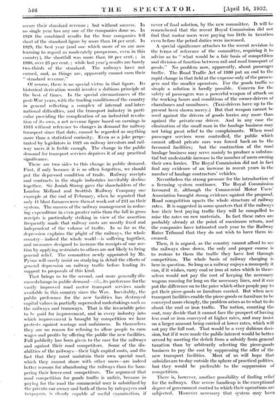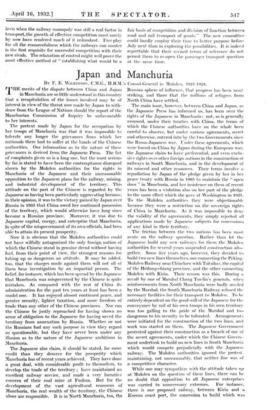Road and Rail
By ARNOLD PLANT.
rpHE railway investor who can take pleasure to-day in -a- letting his mind dwell on the elaborate provisions of the 1921 Railways Act concerning the disposal of surplus Profits has indeed a -grim Sense of humour. Under that Act the Railway Rates Tribunal was to fix the schedules of railway charges so that, so far as practicable with efficient and economical working and management, the railways might each secure a net revenue (their " stan- dard" revenue) equivalent to what they earned from all sources in 1913, with allowances for capital expenditures, economies, and so on, subsequently effected. If actual results exceeded the standard revenue, the Tribunal was required to revise the schedules downwards, in accordance with precise instructions. A great deal of discussion, and no doubt of thought, preceded the fixing of the charges. They were at last brought into operation on January 1st, 1928. The aggregate " standard " revenue fixed for the four companies for 1928 was just over £50 millions.
The Railway Rates Tribunal has no doubt done every- thing that was practicable within its powers, both in first fixing the schedules and in revising them annually as the result of each year's working, to enable the railways to secure their standard revenue ; but without success. In no single year has any one of the companies done so._ In 1923 the combined results for the four companies. fell short of the standard figure by more than 18 per cent. In 1929, the best year (and one which more of us are now learning to regard as moderately prosperous, even in this cotintry), the shortfall was more than 10 per cent. ; in 1930, over 25 per cent. ; while last year' p results arc barely two-thirds of the standard. The railways have not earned, and, as things are, apparently cannot earn their "standard revenue."
Of course, there is no special virtue in that figure. Its historical derivation would involve a dubious principle at the best of times. In the special circumstances of the post-War years, with the t ending conditions of the country in general reflecting a complex of internal and inter- national difficulties, and the transport industry in parti- cular providing the complication of an industrial revolu- tion of its own, a net revenue figure based on earnings in 1913 without reference to changes in 'demand for railway transport since that date, cannot be regarded as anything more than a statistical curiosity. Even as a joke perpe- trated by legislators in 1921 on railway investors and rail- way users it is feeble enough. The change in the public demand for transport services deprives it of any practical significance.
. There are two sides to this change in public demand. First, if only because it is so often forgotten, we should put the depressed condition of trade. Railway receipts and contracts in the staple industries inevitably decline together. Sir Josiah Stamp gave the shareholders of the London Midland and Scottish Railway Company one example at the end of February, when he reported that only 41 blast furnaces were then at work out of 241 on their system. The success of the railway management in reduc- ing expenditure in even greater ratio than the fall in gross receipts is particularly striking in view of the assertion frequently made that railway costs are mostly fixed and independent of the volume of traffic. In. so far as the depression explains the plight of the railways, the whole country--indeed the whole world—is suffering together, and measures designed to increase the receipts of one sec- tion by applying restraints to others are not likely to bring general relief. The committee- newly appointed by Mr. Pybus will surely insist on studying in detail the effects of general depression on railway traffic before lending its support to proposals of this kind.
That brings us to the second, and more generally dis- cussed change in public demand—viz., its preference for the vastly improved road motor transport services made available in this country since the War. Inevitably, the public preference for the new facilities has destroyed capital values in partially superseded undertakings such as the railways and tramways. That is the invariable price to be paid for improvement, and in every industry into which improvement is brought by competition we hear protests against wastage and unfairness: In themselves they are no reason for refusing to allow people to cant wages and profits by offering the public the new facilities. Full publicity has been given to the case for the railways and against their road competitors. Some of the dis- abilities of the railways,----their high capital costs, and the fact that they must maintain their own special Mad, which they cannot share with other .users—are indeed better reasons for abandoning the railways than for ham- pering their lower-cost competitors. The argument that road competition for goods traffic is unfair, because in paying for the road the commercial user is subsidized by the private-car owner and both of them by ratepayers and taxpayers, is dearly capable of useful examination, if . never of final solution, by the new committee. It will be remembered that the recent Royal Commission did not find that motor -users were paying too little in taxation even before the petrol duties were increased.
A special significance attaches to the recent revision in the terms of reference of the committee, requiring it to advi,se as to "what would be a fair basis of competition and division of function between rail and road transport of goods." No problem now, apparently, about passenger traffic. The Road Traffic Act of 1980 put an end to the rapid change in that field at the expense only of the passen- gers and the smaller operators. For the goods traffic so simple a solution is hardly possible. Concern for the safety of passengers was a powerful weapon of attack on the working hours and conditions of the owner-drivers of charabancs and omnibuses. (Taxi-drivers have up to the present been shown mercy.) But that weapon cannot be used against the drivers of goods lorries any more than against the private-car driver. And in any case the elimination of the small man in the haulage business may not bring great relief to the complainants. When road passenger services were controlled, the public which cannot afford private cars was forced back on to the favoured facilities; but the contraction of the road haulage business may serve mainly to produce a substan- tial but undesirable increase in the number of users owning their own lorries. The Royal Commission did not in fact find any evidence of an increase in recent years in the number of haulage contractors' vehicles.
Nevertheless the strong pressure for the introduction of a licensing system continues. The Royal Commission favoured it, although the Commercial Motor Users' Association brought strong evidence against the proposal. Road. competition upsets the whole structure of railway rates. It is suggested in some quarters that if the railways lose their best paying traffic they will be compelled to raise the rates on raw materials. In fact these rates are probably already at the point of maximum return, and the companies have intimated each year to the Railway Rates Tribunal that they do not wish to have them in- creased.
Then, it is argued, as the country cannot afford to see the railways close down, the only and proper course is to restore to them the traffic they have lost through competition. The whole basis of railway charging is here in question. So long as a railway enjoys a monopoly it ean,. if it wishes, curry coal or iron at rates which in them- selves would not pay the cost of keeping the necessary wagons running for long on the necessary lines, and it can put the difference on to the price which other people pay to get their piece-goods or furniture carried. But when new transport facilities enable the piece-goods or furniture to be conveyed more cheaply, the problem arises as to what to do about the coal or iron traffic. The nation, counting the cost, may decide that it cannot face the prospect of having less coal or iron conveyed at higher rates, and may insist on a larger amount being carried at lower rates, which will not pay the full cost. That would be a very dubious deci- sion, but if it were made the public interest would be better served by meeting the deficit from a subsidy from general taxation than by arbitrarily selecting the piece-goods business to pay the cost by suppressing the offer of the new transport facilities. Most of us will hope that subsidies are to-day outside the sphere of practical politics, but they would be preferable to the suppression of competition.
There is, however, another possibility of finding relief for the railways. One severe handicap is the exceptional degree of government control to which their operations are subjected. However necessary that systern may have
been when the railway monopoly was still a real factor in transport, the growth of effective competition must surely by now have rendered much of it redundant. Free play for all the resourcefulness which the railways can muster is the first requisite for successful competition with their new rivals. The relaxation of control might well prove the most effective method of "establishing what would be a
fair basis of competition and division of -function between road and rail transport of goods." The new committee could hardly employ their time to better purpose before July next than in exploring the possibilities. It is indeed regrettable that their revised terms of reference do not permit them to re-open the passenger transport question at the same time.










































 Previous page
Previous page